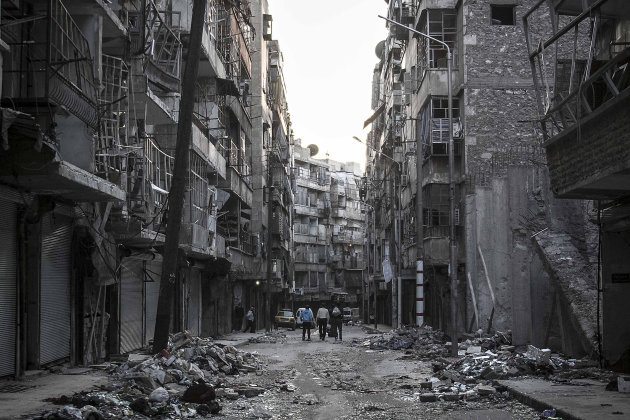
Damaged buildings in the southeast of Aleppo (AP)
Opposition activists in Syria said forces loyal to President Bashar
al-Assad had renewed their heavy bombardment of major cities on
Saturday and Sunday, in spite of the four day truce that was reached by the envoy of the UN ad the Arab League, Lakhdar Brahimi, on the occcasion of the religious feast of Eid al-Adha. Activists said at least 110 people were killed Sunday, a toll similar to
previous daily casualty tolls.
The Syrian army said it had responded to attacks by insurgents on its
positions on Friday, in line with its earlier announcement that it would
cease military activity during the holiday while reserving the right to
react to rebel actions.
In spite of the fact that the truce collapsed, Brahimi is expected to come to the UN Security Council in November with
new proposals aiming to push President Bashar al-Assad and the Syrian
opposition into political talks, UN diplomats told AFP.
The former Algerian foreign minister will head this week for Russia and
China -- the two leading doubters about international pressure on the
Syrian rivals -- to discuss the crisis.
Just as with the attempted truce of Kofi Annan in April it did not take long to
see that Syria is not yet ready for peace. Nineteen months of conflict
has now left more than 35,000 dead, according to Syrian activists. Little is known of what possible negotiating tactic Brahimi is
preparing. But behind the scenes, the United Nations is drawing up plans
to quickly assemble a peacekeeping or truce monitoring force if a new
ceasefire can be agreed.
It also had humanitarian teams and aid ready to go into the stricken
cities of Aleppo, Idlib and Homs if the Eid ceasefire had worked.
Brahimi faces multiple challenges -- Assad's apparent determination to
cling to power, the fractured opposition and arrival of Islamist
fighters.
"He has to persuade key countries in the Middle East not
to support the rebels with arms," told a senior UN diplomat, speaking
to AFP on condition of anonymity. "But if there is to be Security Council action there has
to be agreement from Russia and China," added the diplomat. "If they
don't agree to action then of course Turkey, Saudi Arabia and western
nations will step up their help for the opposition."
Russia and China have used their powers as permanent Security Council
members three times to block resolutions that could have led to Syria
sanctions.


.jpg)


No comments:
Post a Comment